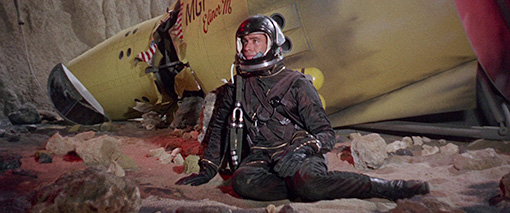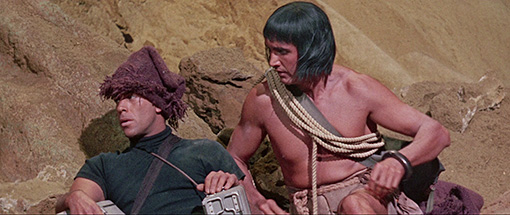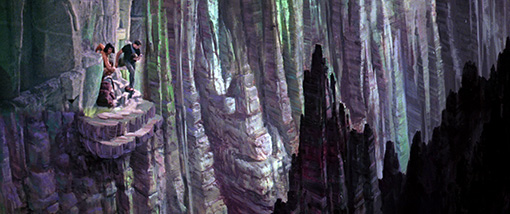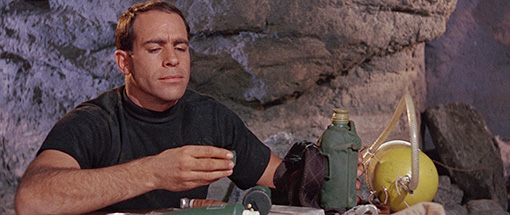|
Even as someone with a fondness for film titles that spell out the basics of the story in no uncertain terms, I can't helping thinking that Robinson Crusoe on Mars sounds more like a pitch to a studio exec than an actual movie title.* Then again, science fiction films of the 50s and 60s were rarely coy about their content and plot lines. Think Attack of the 50 Foot Woman, I Married a Monster From Outer Space or The Incredible Shrinking Man to name but three. And Robinson Crusoe on Mars is true to its descriptive moniker, relocating Daniel Defoe's celebrated novel to somewhere even more isolated and hostile than the island on which the book's titular castaway found himself stranded.
The initial travellers here are Colonel Dan McReady (a pre-Batman Adam West) and Commander Christopher 'Kit' Draper (Paul Mantee), two astronauts on a spacecraft that is orbiting Mars, presumably on the same sort of exploratory mission that the early Apollo craft carried out on the Moon. Also on board is a small, space-suited monkey, a test animal that the boys have grown rather fond of and have thus chosen not to eject into space as originally ordered. When forced to take evasive action by an approaching meteor, the ship becomes caught in the planet's gravitational pull and lacks the fuel required to blast itself free. With an upbeat calmness that suggests this sort of thing happens all the time and is not a big deal, the two men eject in separate escape pods and descend to the planet's surface. Draper has a bumpy landing at a volatile spot that sees his capsule and most of his supplies destroyed by a fireball. The Martian air proves too thin to sustain human life for more than a few minutes at a time, and with only a vague idea of McReady's probable location and just two canisters of air and a minimal supply of food and water, survival becomes an urgent priority for the stranded astronaut.

It's Draper's fight to stay alive that occupies a good part of the first half of the film, a bold decision on the filmmakers' part that could have taken the film into art house territory and transformed it a silent study of isolation, loneliness and the ingenuity and ultimate insignificance of man. But by equipping Draper with a portable recording device (one with the sort of battery life that current smart phone makers would likely kill for) on which to log his observations for future discovery, director Byron Haskin and screenwriters Ib Melchior and John Higgins create the illusion of interaction, allowing Draper to express his feelings and be specific about the nature and severity of the problems he faces without hammering the message home.
Having set up a base camp in a sheltered cave and built a fire from flammable rocks, Draper sets off in search of McReady, only to discover that his crew mate was killed when his escape pod crash-landed. The monkey, however, survived the impact unscathed, and Draper thus adopts him as a companion and one-way conversational partner, much in the way James Stewart's Charles Lindbergh did with a stowaway fly in The Spirit of St. Louis.
What surprises is how smartly developed and how gripping this story of survival against impossible odds proves to be. The level-headed Draper (we can assume that he was militarily trained for this mission) thinks everything through and makes all the right decisions, and as the air and water supplies start to seriously dwindle the tension really mounts, despite our conviction that this unassuming hero will at the very least make it through to the film's final scene. There's a small whiff of deus ex machina to the timely discoveries of solutions to these problems, but this is nicely offset by a degree of scientific plausibility and the observational reasoning that tips Draper off to the presence and eventual location of a water supply. It helps enormously that Draper is so easy to engage with and that his fears and small triumphs are never overplayed, a testament to lead player Paul Mantee, an actor still often remembered solely for this role, despite chalking up over 150 film and TV credits on IMDb. And he does so well here – charged with having to talk to himself for much of the first half without sounding like he's doing so purely for exposition, he carries the dramatic weight of the film with confident ease.

With the monkey standing in for the adopted animals of the original story, all that's missing is a Man Friday, who arrives in the second half in the shape of an alien runaway slave (Victor Lundin), a little dash of irony given that Defoe's Crusoe was shipwrecked when taking part in an expedition to transport slaves from Africa. Yeah, how much sympathy do you have for him now? It's here that the film is most blatant about its source, with Draper naming his new companion Friday, "with apologies to Daniel Defoe," though thankfully the original Friday's conversion to Christianity has been reduced to a couple of philosophical lines about the existence of a supposed supreme being.
The slave group from which Friday fled were being worked as miners by technologically superior aliens in heavily armed ships that bear an uncanny resemblance to the Martian war machines in the 1953 film version of War of the Worlds, which was also directed by Byron Haskin, of course. Here Haskin takes another risk by having the craft shift position at impossible speed and stop dead on a dime – it could have looked daft, but actually adds to the sense that this is technology far in advance of our own. Haskin does, however, milk these ships' repeated attempts to kill Friday – whose wrist shackles act as a beacon through which he can be precisely located – to the point where you start to wonder why blasting him with a death ray is so important to these alien overlords, given that he'll likely expire anyway when his supply of air pills runs out. We can presume that having a slave escape their clutches has really dented these creatures' collective ego.
Despite its moderate budget, Robinson Crusoe on Mars is one of the most gorgeous looking science fiction films of its day, with the Death Valley locations, Winton C. Hoch's lovely Techniscope cinematography, Lawrence W. Butler's special effects and an uncredited Albert Whitlock's handsome matte paintings combining to create a very real sense of a barren and environmentally hostile alien planet. It's this, together with its character and storytelling smarts and a pair of nicely understated performances from Mantee and Lundin, that give the film its longevity and have made it a long-standing genre fan favourite. As thoughtful as it is visually striking, its restoration and UK Blu-ray release is something to be celebrated, and with the setup having been recently recycled for Ridley Scott's critically acclaimed The Martian, it couldn't be more timely.
Given that this is one of the most visually sumptuous science fiction films of its day, this HD restoration is long overdue and lives up to expectations. Framed in its original aspect ratio of 2.35:1, it delivers on all fronts, in the crispness of its detail, the fine balance of its contrast range and the subtle vibrancy of its colours. That the film grain is clearly visible is hardly surprising given the Techniscope process (more on that here), but it always feels organic to the image and not in any way enhanced. This is how we always wanted the film to look. Dust spots are as rare as teeth on flies.

The Linear PCM 2.0 mono soundtrack is also in fine shape, a tad range restricted at times but really scoring on clarity, with Van Cleave's music score coming off best here.
Optional English SDH subtitles are available.
Commentary
If you come to this commentary for analysis of Robinson Crusoe on Mars or information on its making then you're in for as long wait, as the film is not even touched on until 52 minutes into the 110 minute running time, and even then the comments are never screen specific. Hosted by Michael Felsher of Red Shirt Pictures (you'll find their work on the extra features of a number of Arrow Video and Shout! Factory Blu-ray and DVD releases), this is essentially an interview with award-winning visual effects artist Robert Skotak (he bagged Oscars for Aliens and Terminator 2: Judgement Day) in his capacity as the author of Ib Melchior: Man of Imagination. Melchior was the original screenwriter of Robinson Crusoe on Mars and was also slated to direct, but left the project to helm The Time Travellers, which he also wrote. Following some background on his own film work and early interest in visual effects, Skotak reveals how he first met Melchior and then he and Felsher discuss his career in some detail. Eventually the do get onto Robinson Crusoe on Mars, and while the focus remains on Melchior's contribution, the work of his colleagues – including fellow screenwriter John Higgins, art director Al Nozaki, cinematographer Winton Hoch and director Byron Haskin – is also acknowledged. Before the film's end they move on to Melchior's subsequent work, with particular emphasis on Mario Bava's Planet of the Vampires. Personally I'd have liked a commentary that was more specifically focused on this film, but there's too much of interest here to warrant complaint.

Trailer (4:00)
A well preserved trailer that's big on the film's authenticity and lists 'Mona, the Woolly Monkey' as one of the stars. There are some serious spoilers here and the voice-over is from that time when films were sold by what sounds like former carnival barkers.
Booklet
The key entry here is a solid essay on the film by Paul McAuley, who highlights a few of its scientific inaccuracies but also praises many of the things that mark it as a standout genre work. Reproductions of some of the press material ("This film is scientifically authentic"), guidance on viewing and the main film credits are also included.
An intelligent, gripping and visually ravishing example of American 60s science fiction cinema at its best, gorgeously restored for Eureka's Blu-ray disc. If you have a multi-region player and a larger budget then you might want to consider the US Criterion Blu-ray release, which sports a commentary featuring Ib Melchior, Paul Mantee, Victor Lundin, Al Nozaki, Robert Skotak, and excerpts from a 1979 audio interview with director Byron Haskin. But despite only focusing on the film itself for about half of its length, the commentary here is still of real interest and the transfer of the film itself is top notch, so this disc comes highly recommended regardless.
* It turns out that Robinson Crusoe on Mars was Ib Melchior's original working title and not the one he intended should remain when the film was complete. Apparently director Byron Haskin wanted to call the film 'Gravity Probe One: Mars' but Paramount's sales manager Charles Boasberg thought that made it sound too much like a documentary.
|